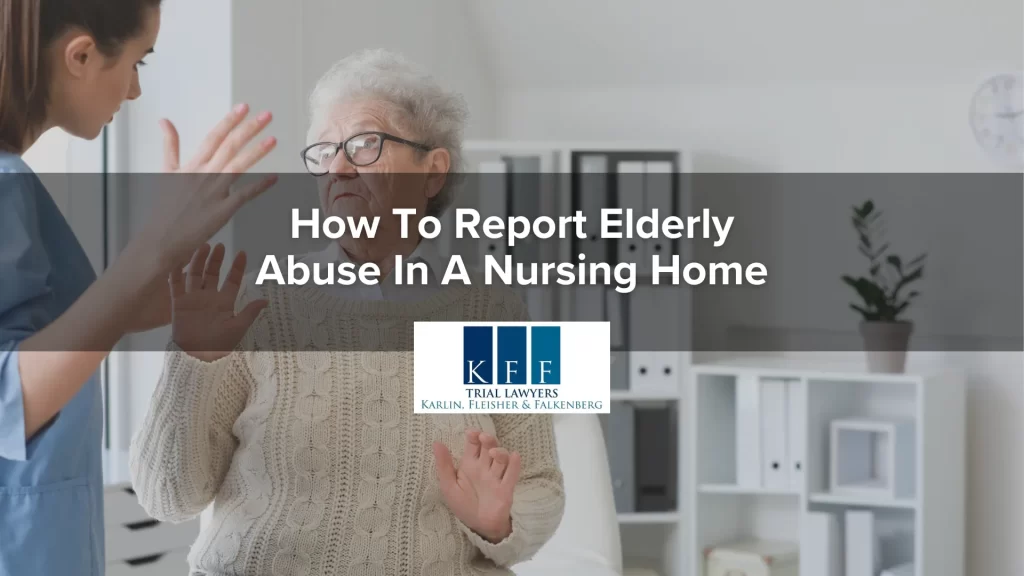
Elder abuse isn’t just a tragedy that affects as many as 5 million older adults every year – it’s also a crime for which the perpetrators deserve to be punished. Contact a lawyer if you suspect your loved one is being mentally, physically, or financially abused in a nursing facility. Knowing how to report elderly abuse in a nursing home to the proper authorities is often the first step to securing justice.
Victims of abuse in a nursing home have legal rights, per the Illinois Adult Protective Services Act. This includes the right to file a lawsuit for compensation.
What is Considered Elder Abuse?
Elder abuse, neglect, or exploitation can take many forms. Any of the following could meet the definition of abuse laid out in the Illinois Nursing Home Care Act:
- Physical abuse, like pinching, slapping, hitting, or pulling hair. While it is perhaps the most visible form of abuse, it can still be difficult to detect, as some may attribute its effects to an elderly person’s clumsiness.
- Emotional or psychological abuse, like berating, name-calling, shaming the person’s abilities, or yelling. Emotional abuse can cause the victim to develop anxiety, depression, or PTSD.
- Sexual abuse, including touching, taking photos, or making derogatory comments about the person’s body. A pernicious aspect of sexual abuse is that the victim may feel shame about coming forward with allegations or struggle to articulate what happened to them.
- Financial abuse, including fraud, confidence scams, extortion, and overbilling by a nursing facility. Elderly people are often the targets of romance and internet scams.
- Abuse through neglect, such as failing to feed or give water, turning bedbound patients to avoid bedsores, or withholding medication. Neglect can lead to malnutrition or contribute to the spread of disease or infections.
Abusers aren’t limited to caregivers or assisted living facility employees. Elderly patients in long-term care facilities may also be victims of resident-on-resident abuse. It’s the responsibility of the staff members to detect signs of nursing home abuse and prevent it.
The Process of Reporting Elderly Abuse in Chicago
For emergencies, call 911 to report elderly abuse in a nursing home. However, if you aren’t sure if your loved one is suffering from abuse, you can report elder abuse suspicions to the state’s long-term care ombudsman. This agency investigates claims of elder abuse in long-term care facilities. A representative can also help with eldercare locator services if you wish to move your loved one out of the abusive situation.
The process to report suspected elder abuse can proceed as follows:
- Gather specific details of the abuse. This includes what happened, who did it, and where.
- Take photos or a video if you can. You can also record your loved one’s accounts of the abuse for authorities.
- Talk to your loved one’s doctor. Many elder abuse symptoms are similar to normal aging injuries, like falls or memory loss. Medical professionals may be able to discern abuse from a simple accident.
- Submit the complaint to Adult Protective Services or another authority for investigation.
- Contact an elder law attorney or a personal injury lawyer for advice about filing a lawsuit.
Who Do You Report Nursing Home Abuse To?
The Illinois Department on Aging offers many resources for families to report suspected abuse. If you’re worried that the abuse involves staff at your loved one’s care home, it’s best to avoid reporting abuse to the facility. Call a lawyer instead, or seek help from one of these agencies:
- Contact the Regional Ombudsman, based on the region or county you live in. You can find the one closest to you here.
- Call the Senior HelpLine, administered by the Illinois Department on Aging.
- Contact the Illinois Department of Public Health (IDPH).
- Alert the Healthcare and Family Services for Supportive Living Facility Complaints.
- Get in touch with the Illinois State Police Medicaid Fraud Unit. Many nursing homes and assisted living facilities accept Medicaid for treatment and accommodations. The director or other employees may have committed Medicaid fraud if they billed the state for services your loved one didn’t receive.
Can You Sue a Nursing Home for Abuse?
 Yes, you can help your loved one file a lawsuit for nursing home abuse. Even if they are a victim of resident-on-resident abuse, the nursing home may still be held liable. The staff is supposed to protect residents from abuse by other residents.
Yes, you can help your loved one file a lawsuit for nursing home abuse. Even if they are a victim of resident-on-resident abuse, the nursing home may still be held liable. The staff is supposed to protect residents from abuse by other residents.
A Chicago nursing home abuse lawyer who understands the complexities of these cases can help you seek compensation for your loved one. They can gather evidence carefully without alerting the nursing home of an impending lawsuit. They can also book an expert witness to parse abuse allegations from a faulty memory or an accident.
Your attorney can also pinpoint specific laws that a long-term care home or caregiver violated. The intent of a lawsuit is to help your loved one recover compensation, which can serve as a form of justice and accountability. Moreover, elder abuse is a crime, and initiating a lawsuit can also lead to criminal charges against those involved.
The compensation your loved one receives from the lawsuit can pay for accommodation in a new, safer facility. It can also help them get the therapy they need to recover from the abuse and enjoy a better quality of life.
Elder abuse doesn’t just happen in long-term care communities. If your loved one has a home health aide, they could be a victim of abuse in their own home. Financial abuse is especially common in situations where an isolated senior is dependent on a caregiver to manage their finances.
Do You Need Help Reporting Abuse of an Elderly Loved One?
Are you worried your elderly loved one is being abused by a caretaker in a nursing home and want to report it? Contact Karlin, Fleisher & Falkenberg, LLC today to speak with one of our compassionate nursing home abuse lawyers in Chicago. Our legal team can investigate the claim and present you with legal options to help your loved one. Call 312-346-8620 today for a free consultation.
Related Reading:
